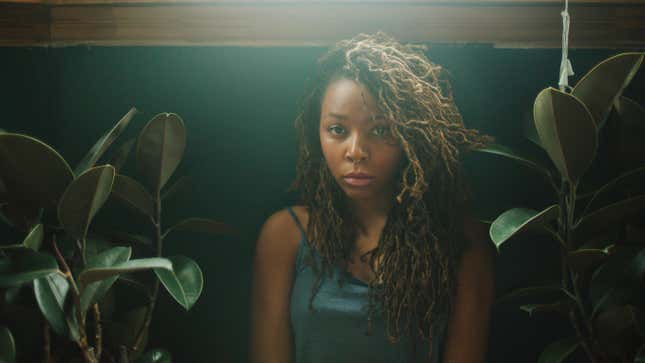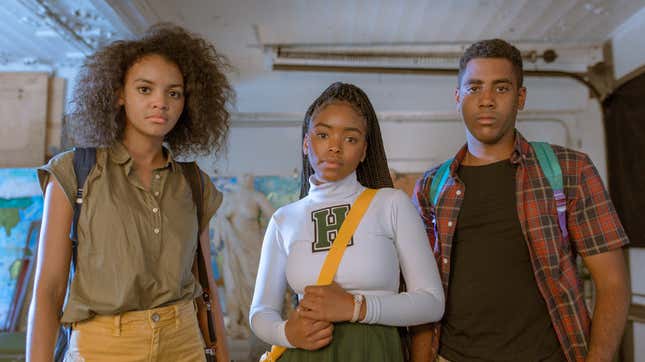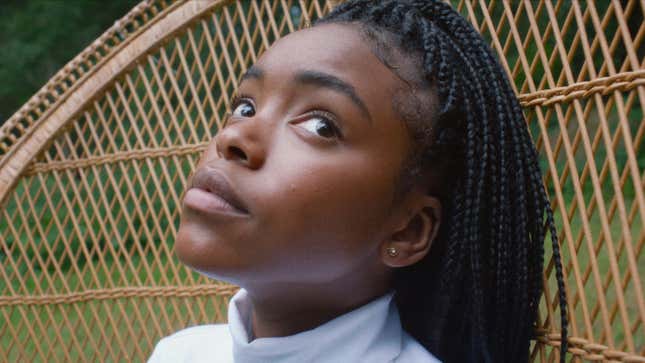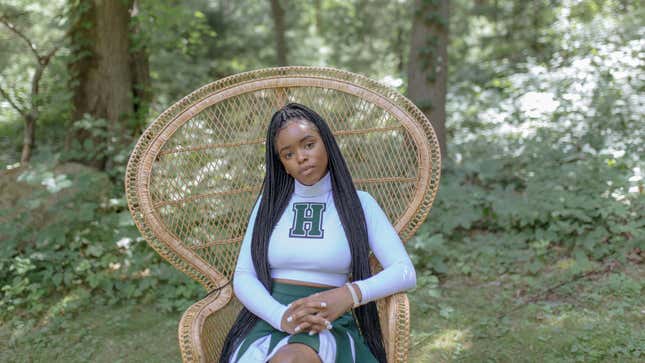
Written and directed by Tayarisha Poe, Selah and the Spades has been on my anticipated list for a while. In fact, though I didn’t get to attend that year, it made the top of my 2019 Sundance Film Festival black-ass experience list.
A monumental time in any director’s life, this film is Poe’s first feature. In fact, the now-30-year-old started the process when she was just 21 years old,
The official synopsis, via Amazon:
In the closed world of an elite Pennsylvania boarding school, Haldwell, the student body is run by five factions. Seventeen-year-old Selah Summers (Lovie Simone) runs the most dominant group, the Spades, with unshakable poise, as they cater to the most classic of vices and supply students with coveted, illegal alcohol and pills. Tensions between the factions escalate, and when Selah’s best friend/right hand Maxxie (Moonlight’’s Jharrel Jerome) becomes distracted by a new love, Selah takes on a protégée, enamored sophomore Paloma (Celeste O’Connor), to whom she imparts her wisdom on ruling the school. But with graduation looming and Paloma proving an impressively quick study, Selah’s fears turn sinister as she grapples with losing the control by which she defines herself.
I must say, when I hopped on the phone to talk to the writer-director of a film that doesn’t shy away from the extremely dark depths of a teenager’s world, I wasn’t expecting the lilt of a bubbly voice to meet me on the other end of the phone line, but there Poe was, in all of her effervescent aura. Selah and the Spades is a film that strongly suggests you sit with and digest, so I was eager to get into Poe’s head a bit.
First things first: I had to know the inspiration behind the title. It sticks out for many reasons—it’s pretty damn catchy, and well, I couldn’t help but tie-in the black historical aspect of the term “spade.”
As previously reported on The Root:
“Call a spade a spade”: For more than 500 years, this expression has meant “to tell it like it is.” But it wasn’t until the Harlem Renaissance of the 1920s that “spade” became a disparaging code word for black people.
“I originally called them ‘The Spades’ because of, honest to God, this Motörhead song, ‘Ace of Spades,’ Poe told me. “I just really liked the loud and proud anger from that [song]... I really related to that when I started writing this story back in 2013. But, at the Sundance Labs, one of my advisors was Walter Mosley. And I hope this doesn’t feel like I’m calling him out, I love him dearly, [as he gives me] free advice constantly. But one of [his pieces of] advice was: ‘You’ve got to change the name from The Spades because you can’t have a bunch of black people being spades.’ So, I took that to heart. I was like, ‘Wow, you know what? That’s a really interesting point. I really admire you, I love your work and I respect you so much, you’re my mentor. I’m going to take this to heart.’”

However, Poe decided to sit on it a bit and came to a realization that compromising on the name was compromising her truth. And we can’t have that shit, especially not for black girl narratives.
“But, in the morning I started thinking about it the more it felt, kind of fucked up that I had to change the name of what I was going to call somebody because of white people’s racism. So, I’m like, I’m not changing it. Also Selah, [living] in that prep school environment, she wouldn’t change the name, either.”
It was this initial exchange that cemented my thoughts on the film as an intentional move on Poe’s part: For me, Selah and the Spades gave me vibes of Clueless, Cruel Intentions, Mean Girls, Heathers and more. It sat with the ugliness of teen school spirit in a way that isn’t typically afforded to black girls. Poe provides a world where black girls are inherently flawed and can just be that. While uncomfortable, it’s human…and recognizing our humanity is a basic, yet exasperating request for black girls in this society, ain’t it?
That kind of agency is definitely what I appreciated about the film, especially since, unlike a typical teenage drama, Selah’s arc wasn’t centered around romance because she simply wasn’t interested in it. And that fact is directly addressed in the film, during an exchange between Selah and Paloma.
“It was very intentional and we intentionally talked about Selah being asexual in direction, production and all aspects of the film,” Poe confirmed. “But, also, from the beginning, I knew it was not a story about romance. It’s not a story about power and conflict in romantic relationships, because that feels like a very, very thoroughly covered topic. For me as an audience member, as a teenager, what I felt like I was missing was help in figuring out how to navigate that power struggle that happens between friends. When I look back on my teenage years, it feels like I can’t really remember everybody I ever dated. But I remember every friendship breakup that I’ve ever had.”
Speaking of “all aspects of the film,” I wanted to nerd-out and get some scoop on craft. The saturated colors stood out to me, especially since lighting black subjects beautifully is a significant aspect of showcasing our narratives effectively. So, I had to ask, “what ‘dem mood boards lookin’ like?”

“[Cinematographer] Jomo Fray and I are super tight and we have, like, the same brain. It’s fun to build the visual language for a film that is very much about these black kids, with another black person,” Poe said.
Along with spending “a shit ton of time” corralling inspirational images with Fray, Poe said, “[We spent time] building a specific color language; each faction gets their own set of colors in costume and production design, so they lived within that color space. We were heavily influenced by Rihanna, quite honestly. I just like Rihanna’s savagery!”
As we’re focusing on the vulnerable stage of a young black teenager’s life, I wanted to ask Poe what she’d say to a teen black girl looking up to her for inspiration. After all, she may very well see this film and see herself.
“I would tell her it was going to be a lot of people in this world who want you to feel bad just for being alive, though you should feel really good about being alive and you should be bold and loud and laugh as loud as you fucking want,” Poe mused. “There’s a lot of people angry at you for being happy and even more people angry at you for being sad about the way things are in the world. You do feel what you’re going to feel and feel it out loud, because I feel like young black girls [should] get to express themselves out loud without fear of retribution.”
Lastly, as someone who has navigated through the film festival space, I wanted to ask Poe her thoughts on how the coronavirus pandemic has, essentially, barrelled its way through the film industry and wreaked havoc. For Poe, she’s most concerned (yet hopeful) about the “community” aspect that film festivals and filmmaking support.
“It’s really difficult for me to think about the future of film festivals when I’m just like, Jesus Christ, I just want to make sure all my friends have work [and that the] industry, itself, survives,” Poe said, also adding that she also hopes smaller film festivals are able to emerge and receive more notoriety, as well.

Poe has certainly made her voice known, loud and clear. This won’t be the last you see of her.
“I’m writing a movie right now that I don’t think I can talk about yet, but I’m honestly just excited that I had another movie in me,” Poe confirmed. “I’m really, really appreciative of the folks who are supporting me in that journey. And I’m really looking forward to the day when we can announce this. But, there’s definitely another movie coming.”
Selah and the Spades drops on Amazon Prime Video on April 17.
This interview has been edited and condensed for clarity.



